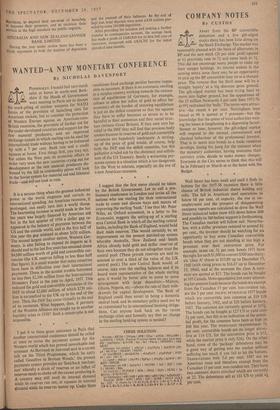WANTED-A NEW MONETARY CONFERENCE
By NICHOLAS DAVENPORT
PERSONALLY, I would feel very much 46.;,safer at home in north-west Berk- shire if the Heads of Government were meeting in Paris not to discuss the stock-piling of nuclear weapons for NATO forces or the provision of launching sites for American rockets, but to consider the protection of Western Europe against an American-cum- British recession, the provision of further aid for the under-developed countries and support for the raw material producers, and an improved exchange system in which sterling can be used for international trade without having to be bolstered up with a 7 per cent. Bank rate and a credit squeeze at home. First things first, you may say, but unless the West puts its economic affairs in order very soon the new countries crying out for development or the raw material producers dis- tressed by the fall in commodity prices will look to the Soviet system for material aid and bilateral trade—and will not look in vain.
* * * It is a serious thing when the greatest industrial power in the world stagnates and curtails its international spending. An American recession, if prolonged, can easily turn into a world slump. The heartening increase in world trade in the last ten years was largely financed by American aid but in the last quarter of 1956 a dollar gap re- appeared in the balance of payments between the US and the outside world, and in the first half of this year the gap widened to about $450 million. The second largest creditor nation, Western Ger- many, is also failing to expand its imports as it should and in the last five years has amassed about $4,000 million worth of gold and convertible cur- rencies (the UK reserves falling to less than half that figure). It is small wonder that many countries have been in difficulties over their international payments. Those in the acutest trouble borrowed no less than $2,300 million from the International Monetary Fund in the year to April, 1957. This reduced the gold and convertible currencies of the IMF to about $2,000 million, of which $739 mil- lion is earmarked to the UK up to the end of the year. Thus, the IMF fias come virtually to the end of its resources. What happens, then, if partners of the Western Alliance are caught up in another liquidity crisis in 1958? Such a catastrophe is not impossible.
* * I put it to these great statesmen in Paris that another international conference should be called at once to revise the payments system for the Western world which has proved unworkable and unsound. As Bertrand de Jouvenel said in a recent talk on the Third Programme, which he aptly called 'Goodbye to Bretton Woods,' the present payments system provides no 'feed-back mechan- ism' whereby a drain of reserves or an influx of reserves tends to choke off the causes producing it. A country may still swell its internal demand while its reserves run out, or squeeze its internal demand while its reserves mount up. Under these conditions fixed exchange parities become impos- sible to maintain. If there is no automatic swelling in a surplus country working towards the restora- tion of equilibrium (if Germany, for example, refuses to allow her influx of gold to affect her economy) all the burden of restoring equilibrium is put on the deficit countries so that the squeeze they have to suffer becomes so severe as to be harmful to their economies and their social struc- ture (witness Great Britain). If they now turn for relief to the IMF they will find that precious body useless because its reserves of gold and convertible currencies are hopelessly inadequate. A writing- up of the price of gold would, of course, help both the IMF and the deficit countries, but this palliative is ruled out by the obstinacy and selfish- ness of the US Treasury. Surely a worsening pay- ments system is a situation which is too dangerous for the West to tolerate, especially on the eve of a new American recession.
I suggest that the first move should be taken by the British Government. Let us call a pre- liminary conference in London and invite all the nations who use sterling for their international trade to come and discuss ways and means of improving the sterling 'bank.' I see that Mr. Peter Wiles, an Oxford economist, in a letter to the Economist, suggests the setting-up of a sterling area Central Bank in which all the sterling central banks, including the Bank of England, would hold their main reserves. This would certainly be an improvement on the present patched-up system whereby Australia, New Zealand and South Africa already hold gold and dollar reserves of their own because they do not altogether trust the central pool. (These private reserves are said to amount to over a third of the value of the UK central pool.) The new Central Bank would, of course, take over the sterling balances and if its board were representative of the whole sterling area it would be better able to come to some arrangement with large depositors—Malaya, Ghana, Nigeria, etc.—about the rate of their with- drawals for capital development. The Bank of England could then revert to being a domestic central bank and its monetary policy need not be so constrained by its international banking obliga- tions. Can anyone look back on the recent exchange crisis and honestly say that no change in the sterling banking system is needed?


































 Previous page
Previous page